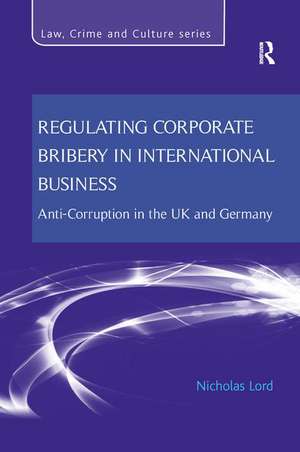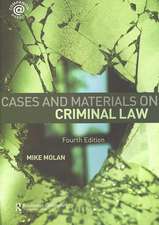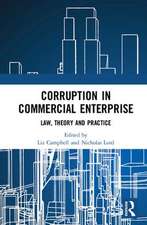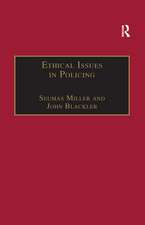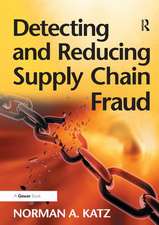Regulating Corporate Bribery in International Business: Anti-corruption in the UK and Germany
Autor Nicholas Lorden Limba Engleză Paperback – 9 ian 2017
| Toate formatele și edițiile | Preț | Express |
|---|---|---|
| Paperback (1) | 484.26 lei 6-8 săpt. | |
| Taylor & Francis – 9 ian 2017 | 484.26 lei 6-8 săpt. | |
| Hardback (1) | 1001.24 lei 6-8 săpt. | |
| Taylor & Francis – 30 sep 2014 | 1001.24 lei 6-8 săpt. |
Preț: 484.26 lei
Nou
Puncte Express: 726
Preț estimativ în valută:
92.68€ • 96.50$ • 78.32£
92.68€ • 96.50$ • 78.32£
Carte tipărită la comandă
Livrare economică 10-24 martie
Preluare comenzi: 021 569.72.76
Specificații
ISBN-13: 9781138637702
ISBN-10: 113863770X
Pagini: 214
Dimensiuni: 156 x 234 x 12 mm
Greutate: 0.34 kg
Ediția:1
Editura: Taylor & Francis
Colecția Routledge
Locul publicării:Oxford, United Kingdom
ISBN-10: 113863770X
Pagini: 214
Dimensiuni: 156 x 234 x 12 mm
Greutate: 0.34 kg
Ediția:1
Editura: Taylor & Francis
Colecția Routledge
Locul publicării:Oxford, United Kingdom
Notă biografică
Nicholas Lord is a Lecturer in Criminology in the School of Law at the University of Manchester. He has research expertise in the area of white-collar and corporate crimes of a financial and economic nature such as fraud, corruption and bribery along with interests in regulation theory and corporate governance. He completed his PhD in criminology and an MSc in Social Science Research Methods in the School of Social Sciences at Cardiff University and his BA in Criminology and German at Lancaster University.
Recenzii
Prize: Nicholas Lord is winner of the Criminology Book Prize 2015, awarded by the British Society of Criminology. Nicholas Lord is winner of the 2014 Young Career Award of the White-Collar Crime Research Consortium / National White-Collar Crime Center, USA 'The significance of Nicholas Lord's book lies in its analysis of the complexities and dynamics of translating international conventions into domestic legislation and then implementing them effectively at a country level. In doing so, it brings to the anti-corruption discourse at both academic and policy-maker levels, a wider perspective in terms of substantive and evidenced understanding of the rhetoric and realities of anti-corruption initiatives and agendas within country contexts.’ Alan Doig, Northumbria University, UK ’Nicholas Lord shows in this conceptually innovative and thoroughly researched comparative study just why efforts to counter transnational corporate bribery - unquantifiable but assumed to be widespread - rarely get beyond the symbolic. Encouraging self-regulation and reaching negotiated settlements with offenders is usually as good as it gets.’ Peter Gill, University of Liverpool, UK ’This excellent book is that rare thing - a readable and detailed examination of the dilemmas that contemporary societies - especially the UK and Germany - face in dealing with corporations operating transnationally in international commerce that use bribery to win or maintain contracts in overseas jurisdictions, often poor countries that most NGO campaigns focus on. Nick Lord persuasively argues that historical traditions have left a contemporary legacy that complicates international co-operation in prosecuting transnational and complexly organised corporate crimes. With well researched case studies, he shows that these historical traditions help us understand the limitations of criminal sanctioning by sovereign actors as an enforcement mechanism for controlling illicit corporate behaviour. He thoughtfu
Cuprins
Chapter 1 Introduction; Chapter 2 What is ‘Transnational Corporate Bribery’ and Why Do We Need to Regulate It?; Chapter 3 Conceptualising the ‘Regulatory’ Framework: Policing as Regulation; Chapter 4 Legal Frameworks for Enforcement: From the International to the National; Chapter 5 1 An earlier version of this chapter was published as follows: Lord, N. (2014) ‘Detecting and investigating transnational corporate bribery in centralised and decentralised enforcement systems: discretion and (de-)prioritisation in the UK and Germany’ Policing and Society, DOI: 10.1080/10439463.2014.895350; Chapter 6 Theories of Enforcement: Prosecution Policies; Chapter 7 Theories of Self-regulation: Manufactured and Organic Self-regulatory Practices; Chapter 8 Understanding ‘Regulatory’ Performance and Determining ‘Adequate’ Enforcement; Chapter 9 The ‘Default Position’: Accommodating Transnational Corporate Bribery;
Descriere
This book is about the regulation of corporations that use bribery in international commerce to win or maintain overseas business contracts and interests. The author argues that despite significant cultural differences between the jurisdictions, UK and German anti-corruption authorities face procedural, evidential, legal, financial and structural difficulties that are leading to convergence in prosecution policies. Although self-regulatory and hybrid mechanisms are aiding the response and gaining some level of regulation, the default position is one of accommodation by state agencies, even where the will to enforce the law is high.
